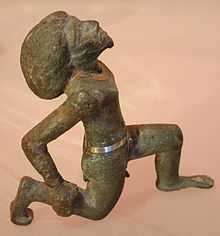Libu

The Libu (![]() , R'bw, Ribou, Labu) were an ancient Libyan Berber tribe, from which the name Libya derives. They were closely related to the Ancient Egyptians.
, R'bw, Ribou, Labu) were an ancient Libyan Berber tribe, from which the name Libya derives. They were closely related to the Ancient Egyptians.
Their occupation of ancient Libya is first attested in ancient Egyptian texts from the New Kingdom, especially from the Ramesside Period. The earliest occurrence is in a Ramesses II inscription.[1] There were no vowels in the Egyptian script. The name Libu is written as LBW or RBW in Egyptian hieroglyphs. In the Great Karnak Inscription Merneptah describes how hostilities between Egypt and Libya broke out and how the Libyans were defeated.[2] Ramesses III defeated the Libyans in the 5th year of his reign, but six years later the Libyans joined the Meshwesh and invaded the western Delta and were defeated again.[3] Libu appears as an ethnic name on the Merneptah Stele, also known as the Israel Stele.[4] Afterward, the name appeared repeatedly in other pharaonic records.
This name Libu was taken over by the Greeks of Cyrenaica, who co-existed with them.[5] Geographically, the name of this tribe was adopted by the Greeks for "Cyrenaica" as well as for northwestern Africa in general.
In the neo-Punic inscriptions, Libu was written as Lby for the masculine noun, and Lbt for the feminine noun of Libyan. The name supposedly was used as an ethnic name in those inscriptions.
See also
References
- ↑ Clark, Desmond J. (ed.) (1982) "Egypt and Libia" The Cambridge History of Africa: From the earliest times to c. 500 BC volume I, Cambridge University Press, Cambridge, England, p. 919, ISBN 0-521-22215-X
- ↑ Breasted, James H. (1906) Ancient Records of Egypt, Part Three, Chicago, §§572ff.
- ↑ J. H. Breasted, Ancient Records of Egypt, Part Four, Chicago 1906, §§83ff.
- ↑ [...] The vile chief of the Libu who fled under cover of night alone without a feather on his head, his feet unshod, his wives seized before his very eyes, the meal for his food taken away, and without water in the water-skin to keep him alive; the faces of his brothers are savage to kill him, his captains fighting one against the other, their camps burnt and made into ashes [...] After Gardiner, Alan Henderson (1964) Egypt of the Pharaohs: an introduction Oxford University Press, London, p. 273, ISBN 0-19-500267-9
- ↑ Fage, J. D. (ed.) (1978) "The Libyans" The Cambridge History of Africa: From c. 500 BC to AD 1050 volume II, Cambridge University Press, Cambridge, England, p. 141, ISBN 0-521-21592-7